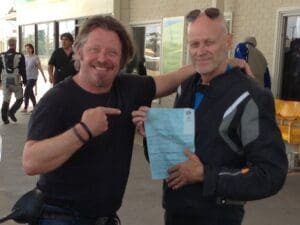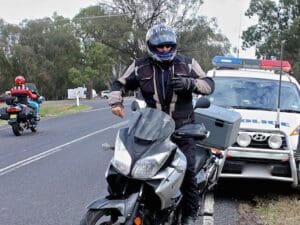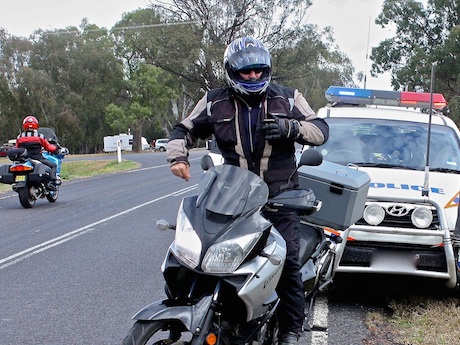If you are pulled over by the police for a traffic offence or even just a licence check or breath/drug test, the best advice is to be nice.

MotorbikeWriter has been informed of several cases recently where fines have been issued – sometimes for bogus reasons – just because the motorist challenged police authority or was simply rude. We don’t condone that sort of police behaviour, but we acknowledge that it sometimes happens.
We asked accredited criminal law specialist Kurt Fowler of Fowler Lawyers for some advice for motorists when pulled over by police and he suggested motorists record the conversation. It is not a legal requirement to ask permission to record unless there is more than one officer present, however, it’s advisable and simply good manners.
Motorists are obliged to identify themselves with a driver’s licence. However, some jurisdictions, such as Queensland, have laws that allow police to photograph you and search for tattoos. Police only need to have “reasonable suspicion” that the rider is associated with a declared criminal criminal club.
Some Australians may be confused about their rights based on Hollywood movies, says Kurt. “The difference over there (USA) is that they have a Bill of Rights which enshrines rights of free speech and freedom of association etc. We don’t have a Bill of Rights,” he says. “We have a Constitution which may be interpreted as a Bill of Rights but it’s not specifically enshrined. You hear people in America talk about their Constitutional rights, but what they are really talking about is the Bill of Rights.”
He says the best advice is to comply with the police. “If they refuse, undoubtedly they would be charged with obstructing a police officer in the execution of their duty and would have to appear in court where, typically, they could cop a fine of a few hundred dollars,” he says.
“The other issue is if a person was to challenge it and say ‘no, I’m not going to take my shirt off as I don’t think you have reasonable grounds’, a court would not accept that in defence. The proper procedure is you let them do it and then challenge it in court; but, of course, the horse has already bolted then.”

Kurt says riders pulled over by police can expect to be questioned. “Police will start asking – and being quite blunt – who are you, where are you from, are you a member of a club and being fairly direct,” he says.
If you believe the police have acted inappropriately or issued a fine which is incorrect, you can have your day in court to exonerate yourself, but don’t expect the police to cop any fines or penalties.
Brisbane solicitor Jim Feehely, says there are many provisions that make the police immune to criminal misconduct when exercising powers and discharging responsibilities. “Police are also generally immune from civil liability as long as they think they are acting under some legislative authority,” he says.
“It also seems that in acting under the criminal organisations legislation, the police can refuse to identify themselves by name, rank and number, or at all.” He says that if you are arrested, the best advice is to contact a lawyer.
Before you head out for a ride, make sure you have the following with you: licence, camera and/or phone, and the name and contact details of your lawyer.


